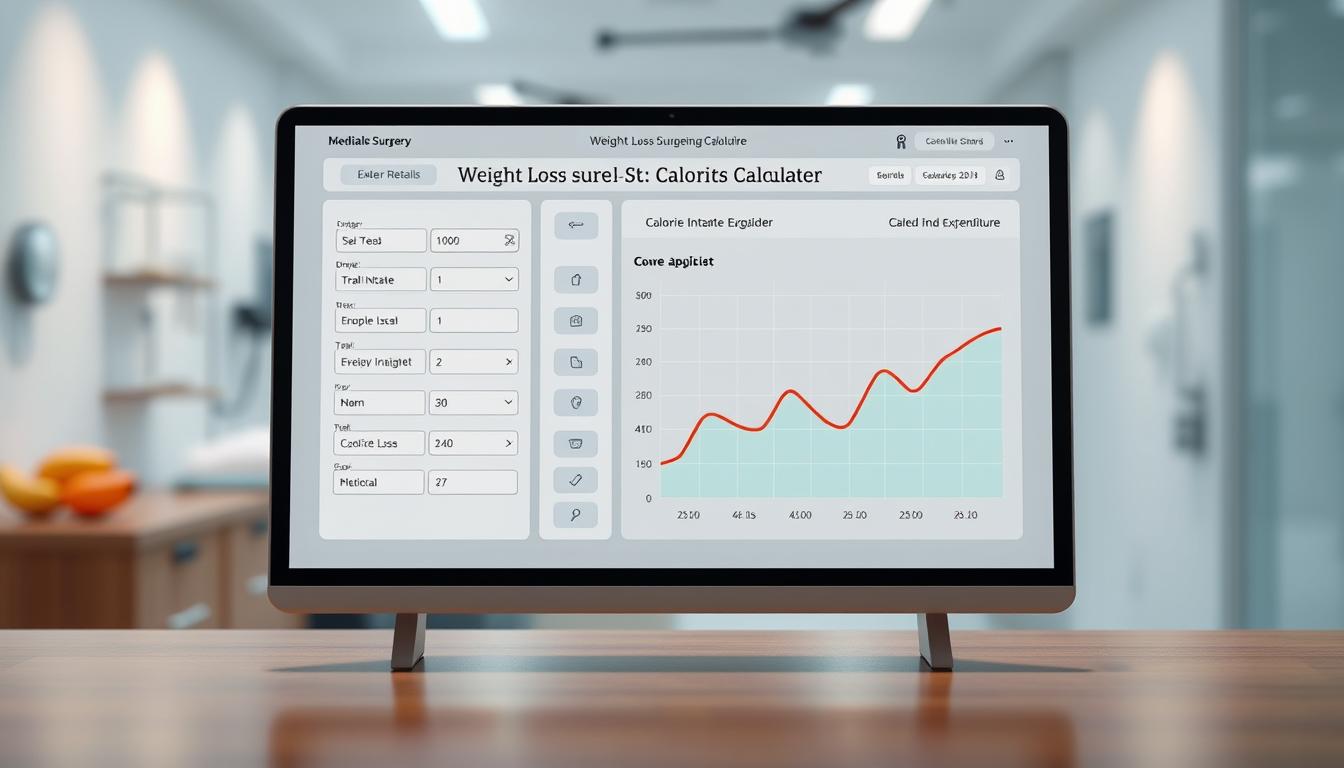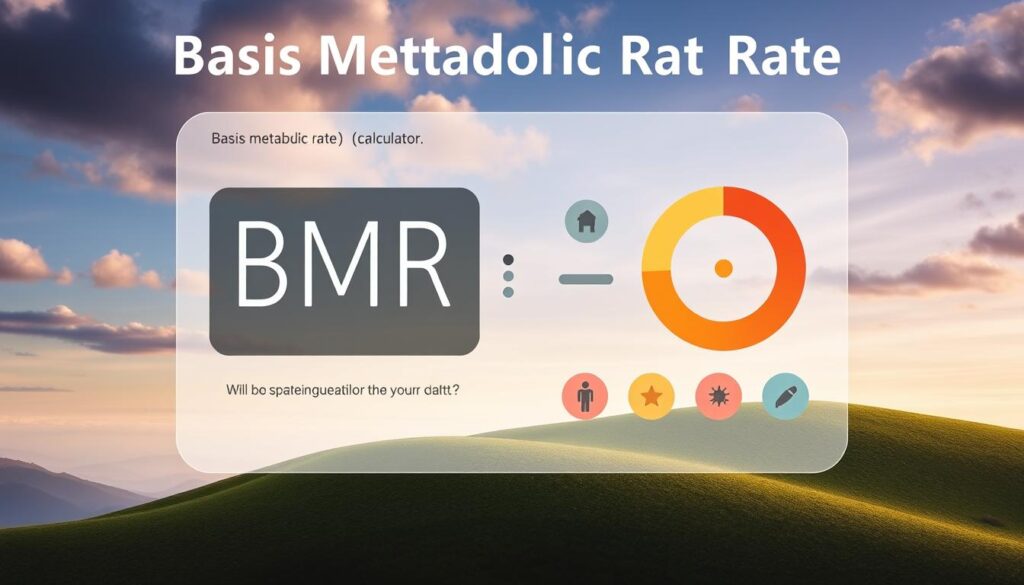“The greatest wealth is health.” – Virgil. This timeless quote emphasizes the importance of health, particularly for individuals undergoing significant transformations, such as those achieved through weight loss surgery.
For bariatric surgery patients, managing calorie intake is crucial for optimal results. Our specialized weight loss surgery calorie calculator is designed to help patients determine their appropriate calorie intake after surgery.
This tool differs from standard calorie calculators by accounting for the unique metabolic changes that occur after weight loss surgery, helping patients set realistic expectations for their weight loss journey.
Key Takeaways
- Our calculator is designed specifically for bariatric surgery patients.
- It accounts for unique metabolic changes after surgery.
- Proper calorie management is crucial for optimal results.
- The calculator helps patients set realistic weight loss expectations.
- It complements medical advice, not replaces it.
Understanding Calorie Management After Bariatric Surgery
Effective calorie management post-bariatric surgery is key to achieving and maintaining weight loss goals. After surgery, the way the body processes calories changes significantly.
Why Calorie Tracking Matters Post-Surgery
Proper calorie management is crucial during the rapid weight loss phase following surgery to prevent nutritional deficiencies. Tracking calories helps patients identify potential issues early and make necessary adjustments to their eating habits.
Setting Realistic Expectations
Understanding the factors that influence weight loss after bariatric surgery can help patients set realistic goals. Our calculator helps patients set achievable goals that align with typical outcomes for their specific surgery type, considering factors like starting BMI, age, and other individual factors.
How Different Bariatric Procedures Affect Weight Loss
Different bariatric procedures yield different weight loss outcomes, making it crucial for patients to understand what to expect from their specific surgery type.
Various factors influence the effectiveness of weight loss surgery, including the type of procedure and individual patient characteristics.
Lap Band Surgery Results
Lap Band surgery typically results in the least amount of weight loss, with patients losing approximately 40-50% of their excess weight.
Sleeve Gastrectomy Outcomes
Sleeve gastrectomy patients usually lose around 60-70% of their excess weight, which is about 10% less than those who undergo gastric bypass.
Gastric Bypass Expectations
Gastric bypass surgery tends to result in more significant weight loss, with patients often losing 70-80% of their excess weight.
SADI and Duodenal Switch Results
SADI and Duodenal Switch procedures can drive approximately 10% more weight loss than gastric bypass, resulting in 80-90% loss of excess weight.
Here’s a comparison of the average weight loss outcomes for different bariatric procedures:
| Bariatric Procedure | Average Weight Loss (% of excess weight) |
|---|---|
| Lap Band Surgery | 40-50% |
| Sleeve Gastrectomy | 60-70% |
| Gastric Bypass | 70-80% |
| SADI and Duodenal Switch | 80-90% |
Step 1: Determining Your Ideal Body Weight
The initial step in our weight loss surgery calorie calculator involves to prevent obesity andinjuries figuring out your ideal body weight based on evidence-based formulas. Our calculator uses various methods to determine ideal body weight, including the Hamwi formula, Robinson formula, and Miller formula.
Height-to-Weight Ratio Considerations
Height-to-weight ratio considerations vary across different body frames. Our calculator accounts for this variation to provide a more accurate ideal weight range. For instance, individuals with a larger body frame may have a higher ideal weight due to their bone density and muscle mass.
Age and Gender Factors
Age and gender are significant factors in calculating ideal body weight. As people age, their weight range may increase slightly due to natural changes in body composition. Additionally, differences in muscle mass, bone density, and fat distribution between men and women are considered in our calculator to provide a more personalized ideal weight range.
To determine your ideal body weight, we recommend using our calculator, which takes into account your height, age, and gender. You can start by visiting our page and entering your details: Am I a candidate for weight loss surgery. For more information on BMI and weight loss strategies, you can also check out BMI weight loss strategies.
Step 2: Calculating Your Current BMI
As we progress through our weight loss surgery calorie calculator, determining your current BMI is the next essential step. BMI, or Body Mass Index, is a widely used metric to assess body fat based on height and weight.
Understanding BMI Categories
BMI categories are crucial in determining candidacy for bariatric surgery. The standard categories are: underweight (below 18.5), normal weight (18.5-24.9), overweight (25-29.9), obesity class I (30-34.9), obesity class II (35-39.9), and obesity class III (40 and above). Most bariatric surgeries require a BMI of at least 35 with comorbidities or 40 without.
How Surgery Changes Your BMI
Bariatric surgery significantly changes BMI over time. Most patients experience a substantial drop in BMI within the first 6-12 months post-surgery. While BMI is an important metric, it’s also crucial to consider improvements in health markers like blood pressure, blood sugar, and cholesterol levels as valuable outcomes of weight loss surgery.
Our BMI calculator simplifies the process of calculating your BMI by using your height and weight. The formula involves dividing your weight in kilograms by your height in meters squared. Understanding your BMI helps in assessing the potential benefits and risks associated with different bariatric procedures.
Step 3: Finding Your Basal Metabolic Rate (BMR)
Your Basal Metabolic Rate (BMR) represents the number of calories your body burns at complete rest just to maintain basic life-sustaining functions.
We use established formulas like the Mifflin-St Jeor or Harris-Benedict equations to estimate your BMR based on age, gender, height, and weight.
What BMR Means After Surgery
For bariatric surgery patients, understanding BMR is crucial as it indicates the daily calories needed at rest.
Traditional BMR calculations may need adjustment post-surgery due to changes in body composition and metabolic rate.
How Surgery Affects Your Metabolism
Different bariatric procedures can affect your metabolic rate in various ways.
Some surgeries, like gastric bypass, may increase your metabolic rate due to hormonal changes, while weight loss itself typically causes BMR to decrease as your body becomes smaller.
Using Our Weight Loss Surgery Calorie Calculator
To ensure you’re on the right track with your weight loss journey, using a reliable calorie calculator specifically designed for bariatric surgery patients is essential. Our weight loss surgery calorie calculator is tailored to provide personalized calorie recommendations based on your unique needs and surgery type.
Required Information for Accurate Calculations
To get accurate results from our calculator, you’ll need to input some key information, including your current weight, height, age, gender, activity level, surgery type, and time since surgery. Providing detailed and accurate information ensures the calculator gives you the most relevant calorie targets.
Interpreting Your Results
Once you’ve entered the required information, our calculator will provide you with a personalized calorie range. It’s essential to understand that these results are guidelines rather than strict rules, helping you plan your nutrition and stay on track with your weight loss goals.
Adjusting Calculations for Different Surgery Types
Different bariatric surgery procedures, such as gastric bypass and sleeve gastrectomy, have different nutritional requirements. Our calculator takes these differences into account, providing tailored advice to support your specific needs and ensure optimal weight loss and overall health.
Step 4: Creating Your Calorie Deficit Plan
A well-structured calorie deficit plan is vital for maximizing weight loss results post-bariatric surgery. We will guide you through creating a sustainable plan that accounts for your post-surgical needs and restrictions. A calorie deficit occurs when you consume fewer calories than your body burns, driving weight loss.
Safe Deficit Ranges After Surgery
For bariatric patients, it’s crucial to maintain a safe calorie deficit to avoid extreme restriction, which can be dangerous. Generally, a daily deficit of 500 to 1000 calories is recommended for a steady weight loss of 1-2 pounds per week.
Timeline Expectations for Weight Loss
Most patients experience rapid weight loss in the first 3-6 months after surgery, with a gradual slowdown thereafter. It’s essential to adjust your calorie targets as your weight loss slows or plateaus, working closely with your healthcare providers to meet your weight loss goals within a healthy time frame.
Nutrition Guidelines Following Different Procedures
Different bariatric procedures require distinct dietary approaches for optimal weight loss and health. The anatomical changes resulting from each surgery type dictate specific nutritional needs.
Diet After Sleeve Gastrectomy
After sleeve gastrectomy, patients must adapt to a significantly smaller stomach capacity. This requires consuming nutrient-dense foods in smaller portions, with a focus on high-protein intake to support overall health and weight loss.
Nutrition After Gastric Bypass
Gastric bypass surgery involves both restrictive and malabsorptive components. Patients need to be mindful of their nutrient intake, particularly fat-soluble vitamins and minerals, to prevent deficiencies.
Eating Plan for SADI-S and Modified DS
For SADI-S and Modified DS procedures, which have a strong malabsorptive component, vigilant nutritional monitoring is crucial. Patients must be aware of their increased risk for nutritional deficiencies and take proactive measures.
Monitoring and Adjusting Your Calorie Intake Over Time
As you continue your weight loss journey after bariatric surgery, it’s crucial to monitor and adjust your calorie intake. Weight loss naturally slows over time as your body adapts, and your calorie needs change accordingly. To maintain progress, it’s essential to identify weight loss plateaus and implement strategies to break through them, such as calorie cycling, macronutrient adjustments, and activity modifications.
Typically, 12-18 months after surgery, you’ll transition from the weight loss phase to weight maintenance. Our weight loss calculator can be used for maintenance calorie calculations once you’ve achieved your goal weight or your weight loss has naturally plateaued. Regular follow-up with healthcare providers is vital to monitor nutritional status and make dietary adjustments as needed.
Factors such as pregnancy, aging, illness, or medication changes may necessitate recalculating your calorie needs. Adopting sustainable eating patterns that support long-term weight maintenance while ensuring nutritional adequacy is key. By doing so, you’ll be able to maintain your weight loss and overall health in the long term.







